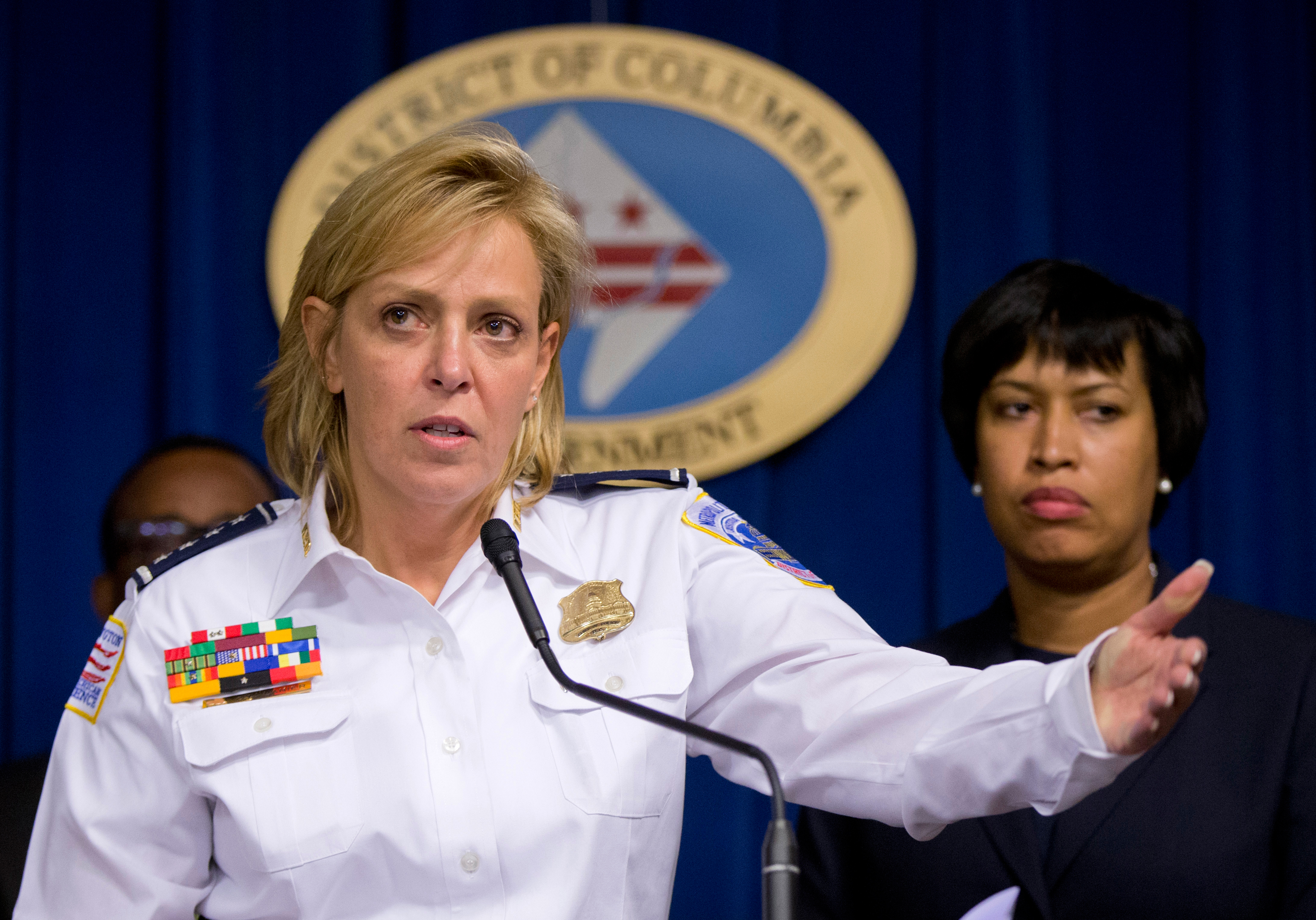WASHINGTON — Sipping periodically from a small green bottle of Perrier mineral water, a very relaxed and somewhat nostalgic Cathy Lanier said, “I think people in the nation’s capital should feel comfortable that they have a very safe city, a well-trained police force and a very solid network with our federal partners. People should come here and just feel confident that they are in good hands.”
It was her closing comment during an exclusive interview with WTOP on Aug. 9.
Ironically, one week later, she announced she was leaving to become the chief security officer for the National Football League.
Notoriously coy about her private life throughout her career, she held true to form that day, not letting on what her next play would be.
The new threat D.C. faces
She was, however, very outspoken about the significant security threats D.C. and its police force face in the wake of repeated warnings from the FBI and other U.S. government intelligence and counterterrorism agencies.
“The terrorist threat has changed now in that homegrown violent extremism, self-radicalization and other different types of threats are not going to come with a long lead time, and all the warning signs and the trip wires,” she said. “These are threats that you have to just make the assumption could be growing in your community at any given time.”
She’s been receiving detailed warning about emerging terror threats since becoming police chief 9 1/2 years ago — but in recent months, they’ve become more pronounced.
“When we look at the threat reporting, emanating from ISIL and other homegrown violent extremists around the country, we know there is a constant and persistent threat to the district,” said Joshua Skule, now the FBI’s assistant director in charge of intelligence during an interview with WTOP in January. ISIL is the term used by some government officials to describe Islamic State militants.
“Washington, D.C., is the seat of power of the United States,” said Skule, who was formerly a special agent in charge of intelligence at the Washington field office of the FBI. He added, “It would give a terrorist organization no greater benefit than to attack it.”
The FBI’s D.C. office told WTOP in a statement in early August, that threat is still significant.
“Because of the national significance of Washington, D.C., and the vast number of potential geographic and human targets, Northern Virginia and the surrounding area are likely to continue to experience arrests of individuals who have provided material support to designated terrorist organizations,” said FBI spokesperson Lindsay Ram.
Lanier acknowledged that staying ahead of the threat is difficult and requires constantly studying global trends and their impact on D.C. and the ability to react quickly.
Terrorism is but one of many issues she has faced, but recognized she didn’t do it alone, she said. Lanier credited her staff and law enforcement partners numerous times for the department’s success. During the interview session, she walked over and picked up a recent photograph of herself with former D.C. Police Chief Isaac Fulwood, and expressed her gratitude for his mentoring on policing strategy and tactics.
She credited him and others for her evolving understanding of the complex variety of threats facing D.C. — especially terrorism.
“I’ve spent the last 16 years of my career focusing on the counterterrorism side,” she said. “And when it comes to policing and security for the nation’s capital, there’s no more important area of focus when it comes to what should be the most secure city in America.”
Targeting of police officers
Another grave concern for the D.C. police force, according to Lanier, is the targeting of police officers.
“Was I surprised that this had moved to this level? No, I think that the constant coverage of negative images of police and negative images of police in communities is involved in police-involved fatal uses of force … Sooner or later it was in the back of my mind that this was going to drive more conflicts and threats for our police officers.”
The low point: Navy Yard shooting
What keeps her up at night?
“What haven’t I thought about?” she said. “And if I have thought about it, how quickly can I get into the plan and put that protective measure in place?”
As she prepares to exit D.C., she reflected on the highs and lows of her tenure. The most profound moment for her occurred on Sept. 16, 2013, during a mass-casualty event at the Washington Navy Yard. It was the speed of the event that resonated with her.
“Ten out of 12 victims were killed in the first six minutes,” Lanier said. She acknowledged that police officers don’t expect a walk in the park on the job, but, “to see so many lives lost senselessly, hearts broken, so many people whose loved ones didn’t come home, those are the (events) that are the most troublesome.”
But horrific events like that are also the motivating factors that, Lanier said, “reinforce my commitment to get up out of my bed in the middle of the night and come back to work after someone has lost their life.”
Near the conclusion of the interview, Lanier migrated from the chair at her desk to a treadmill stationed by a window facing the street in front of police headquarters. She carried a stack of papers.
“This is how I get my reading done,” she said.
Constantly on the move, constantly adjusting, Lanier is a big believer in a strategic planning and tactical adjustments. No doubt, she will likely be calling a lot of audibles as she migrates to be the NFL’s top cop.








